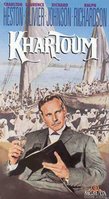 Garnet Wolseley (lower right) was probably the British Empire’s most successful general, both on the battlefield and in career terms.
Garnet Wolseley (lower right) was probably the British Empire’s most successful general, both on the battlefield and in career terms.In the movie Khartoum, his personal relationship with Charles Gordon is obscured; a cabinet officer suggests Gordon be sent to the Sudan and the Prime Minister Gladstone character endorses the idea. The Gladstone character then meets Gordon at the train station for a send-off. Later, when a rescue decision is made, the film portrays Wolseley as operating under secret orders from Gladstone not to approach Khartoum/Gordon too quickly or too near.
Shades of that purported "Grand Conspiracy" to keep Mac out of Richmond!
In reality it was Wolseley himself who recruited his friend Gordon to go to Khartoum and sent him off. But Wolseley’s choice of route for his relief expedition was so strange that delay may have produced a conspiracy meme to understand his bizarre decisions. More on that next time when we match his actions as reliever against the ACW analyses he wrote.
Wolseley wrote a great deal about the American Civil War, first as an observer who spent time with Lee and McClellan (he was about McClellan’s age), and then as a commentator/reviewer on the Battles and Leaders series. I have isolated some of his views: direct quotes are in marks, otherwise I paraphrased. Note that his first-hand impressions ended in early ’63.
On Rebel cavalry
They attained first class status as irregular cavalry; there was no attempt to drill them or train them as anything else and they became the best of that type. The Union went wrong in pursuing a conventional cavalry path and thereby failed to achieve competence as irregular or regular cavalry. “… their puzzled [Yankee] enemy, clogged with all the routine of drill, without officers able to direct it, or soldiers sufficiently instructed to perform it, is trying in vain to discover their whereabouts.” (1863)
On efficiency
“What strikes the regular soldier in these campaigns of General Lee is the inefficient manner in which both he and his opponents were served by their subordinate commanders, and how badly the staff and outpost work was performed on both sides.” (1863)
On Civil War armies
“It is most difficult to move with any effective precision young armies constituted as these were during the war. The direction and movement of large bodies of newly raised troops, even when victorious, is never easy, is often impossible.” (1863).
On railroad delivery of men to battlefields
It is an error to believe such and is perpetrated by Beauregard’s account of Bull Run. For artillery and cavalry, this is impossible. For infantry, highly improbable because train order of movement and debarkation will produce a hodge-podge of forces. (1883)
On civilian (public) opinion
It was “… the true criminal.” “… he [public opinion] took into his ignorant hands the entire conduct of this part [1861] of the war.” (1883)
On the Lincoln/Stanton military policy
“Go straight at the enemy at the very point where he expects you… Let everyone know what you are going to do, so that we may announce it in the public press, and chuckle and crow over your coming victory. Scatter your forces in as many directions as possible, so that the enemy may always be able to bring superior forces against you. Arrange your force so that it is rigidly tied to one particular point, and that the enemy cannot doubt where you will be. Go ahead without preparation, forethought, or care; only let us hear that you are moving, so that the newspapers may brag.” (Date unknown, after 1883)
He records a friend’s reaction to reading Stanton’s orders to Pope: “… he literally ‘laughed until he cried,’ and never fully understood what the expression meant until doing so.” (After 1883)
On Lincoln’s lack of civil policies
“The safe retention of private property is made to depend upon the will and pleasure of some petty provost marshal of the neighborhood – a functionary who has also the power of consigning the owners, and perhaps their families” to prison. “Tyranny and illegal arrests have stricken them [under occupation] with terror.” “Every species of minor annoyance has been resorted to by federal authorities.” (1863)
Previous post here.



